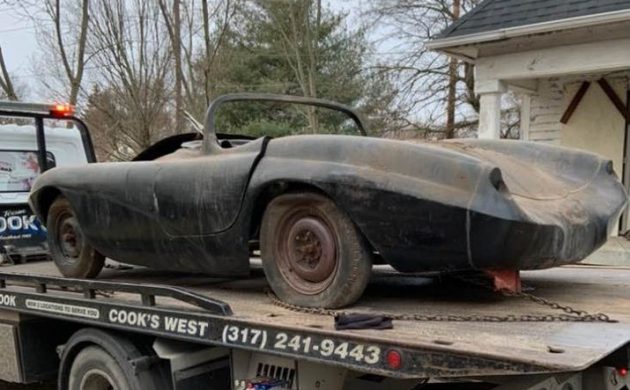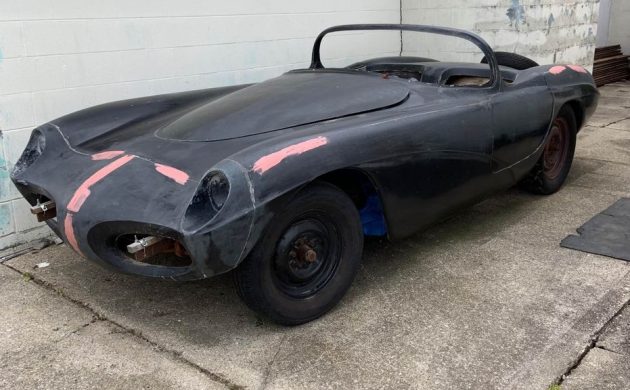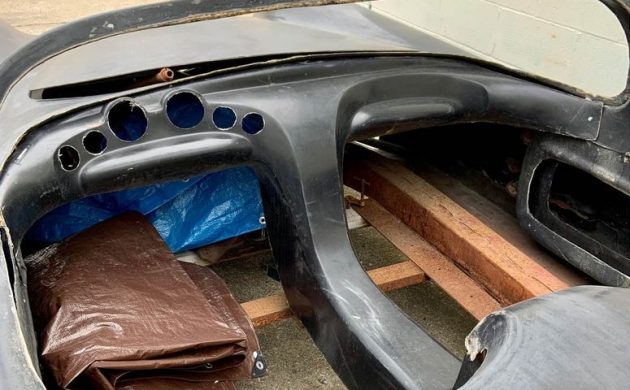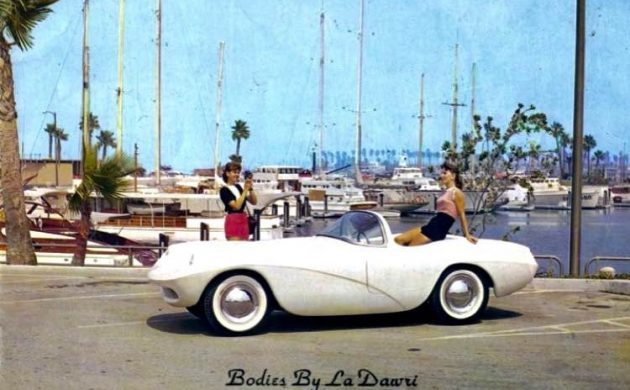Kit cars can tend to occupy an uncomfortable area in the automotive world. They can lack the desirability of some classics, while their build quality can be sadly lacking. This 1957 La Dawri Conquest could be an exception to those rules. The body features distinctive styling queues, and its quality appears to be a rung or two above what you might expect in a vehicle of this type and age. It also offers the possibility of performance that would leave many kit cars in the shade. It will require plenty of work before it is ready to grace our roads, but it is a vehicle that is guaranteed to turn heads once completed. I do have to take the opportunity to thank Barn Finder Darrun for spotting the Conquest for us. It is located in Greenfield, Indiana, and has been listed for sale here on Facebook. The owner has set the sale price at $3,000, and it appears that he is pretty firm on that figure.
The Conquest was the brainchild of a gentleman named Leslie Dawes, who formed La Dawri Coachbuilders in British Columbia, Canada, in 1956. By 1957, he had moved his operation to Long Beach, California. Initially known as the Cavalier when it broke cover in 1956, the model was renamed the Conquest in 1957. Unlike many kit cars, the Conquest wasn’t primarily designed to fit on a specific chassis but could be bolted to virtually any that featured a wheelbase of 100 inches. In this case, the original builder chose a 1953 Plymouth frame, and it seems to fit this pretty nicely. The frame shows some surface corrosion but no penetrating rust. One of the attractions of this vehicle as a project is that dismantling it to address that corrosion would be a straightforward task. The fiberglass body does have a few flaws, but these have not deteriorated beyond the point of no return. One aspect of this kit that I find interesting is the fit of the panels. Some of these kits feature panel gaps that you could drive a large pickup through, but these are surprisingly tight. It would also be possible to improve this further when any fiberglass flaws are being addressed. Finding external hardware like handles that can be adapted to fit should be possible, but the windscreen could prove to be a headache. Thankfully, there are a couple of owner’s clubs that might be able to offer assistance with this and locate items like the correct grille inserts. There’s no arguing that the styling of the La Dawri is striking, but the buyer might be able to equip it so that it offers performance that will match those good looks.
There is no interior trim for the buyer to consider, so they could trim the car however they wanted. There are a few things that stand out for me when I look at this photo. The interiors of kit cars can have a compromised appearance, but I like how La Dawri so nicely integrated the gauge cluster into the dash design. It offers the possibility of a better level of fit and finish than most kits, where this area can look pretty scrappy. I also like the backbone transmission tunnel that extends uninterrupted from the dash to the rear scuttle. This feature should add some torsional rigidity to the fiberglass, but it also provides the perfect place to mount switches, a radio, and a stubby shifter for the buyer’s transmission of choice. When you combine these two characteristics, they suggest the potential for an extraordinary interior experience. The other area of many kit cars that can be a compromise is the frame and drivetrain configuration, So many kit cars are based on humble Volkswagen underpinnings. While these are a bulletproof solution with parts that are easy to source, even the most svelte of vehicles can lose something when the engine fires into life and those within earshot here the distinctive note of an air-cooled flat-four. That is where the La Dawri comes into its own. It allows a more traditional front-engine/rear-drive configuration that is a feature of many sports cars, and there’s room under the hood to slot a V8. When you consider how light this vehicle would be with its fiberglass body, even a mildly-tuned V8 could ensure impressive performance. This Conquest is a roller, although there is currently the bottom half of a Chevy small-block occupying the space under the hood. The buyer might choose to build this, or they might have something else kicking around in their workshop that they could slot in. The world is your oyster with this car, so you could let your imagination run wild to create something spectacular.
If you have a fertile imagination, I’m sure that you can see a world of possibilities locked up in this 1957 La Dawri Conquest. Even a reasonable mild V8 would offer stunning performance, and your chances of finding yourself parked next to an identical example at a Cars & Coffee is virtually nil. Justifying this build from a financial perspective is complicated because this isn’t a mass-produced classic with a known market value. That made me think about what it could be worth if the owner completes the build to a high standard. The simple fact is that we can’t rely on NADA or Hagerty for a valuation, so we have to consider past sales results as a guide. I did find an example that sold around 3-years-ago, and it was an exceptional vehicle. Its finish was flawless, the owner had upholstered the interior in leather, and it had a Chevy small-block under the hood. That car sold for $57,000. I’m not saying that this Conquest will command that sort of price once completed, but it does provide some idea of the potential that is locked away in this fabulous kit car. Is that potential that you would be willing to unlock?








When the father of the bride told the future groom his daughter had a dowry, this is NOT what he expected.
Early Corvette Windshield?
Inverted GMC pickup windshield
Inverted GMC truck windshield.
Oops double windshield reply,
The LaDawri Conquest was designed for a US norm 56″ – 58″ tread with a wheelbase of 101″ – 103″. Recommended was a 2″ x 3″ steel tube frame with “cantilever sprung solid axle suspension for road and track or coil suspension for boulevard use.” They were not cheap. The 1C package (most complete) was $ 895.00 f.o.b. factory. Frame kit 1C with 2″ x 3″ tube, parts and modifications was $ 295.00 f.o. b. factory. 1957 prices!
Of course other frames could be used based on ones’ DIY skills and with the exception of the Henry J they would have to be shortened. The Henry J could squeak by @ 100″, but it’s tread was 54″ front and rear. Mods required. All 1953 Plymouths had a wheelbase of 114 inches.
Looks like a Disney cartoon car.
Ripe for an LS conversion!
I was thinking an early hemi would be cool in that
I had a partial, cut-up body once in Oklahoma City. Took me a long time to discover what it really was. It was a dream I gave up on and sold it to a car collector junkyard.